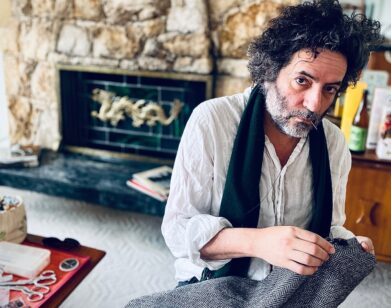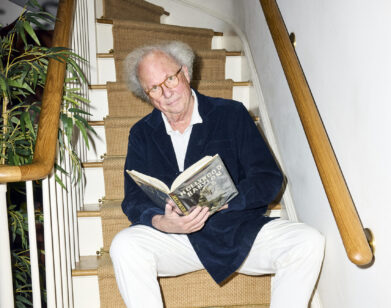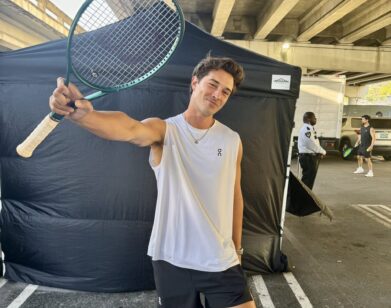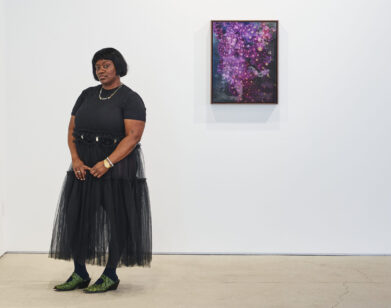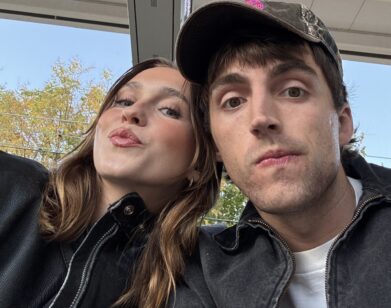Discovery: Laura Dreyfuss
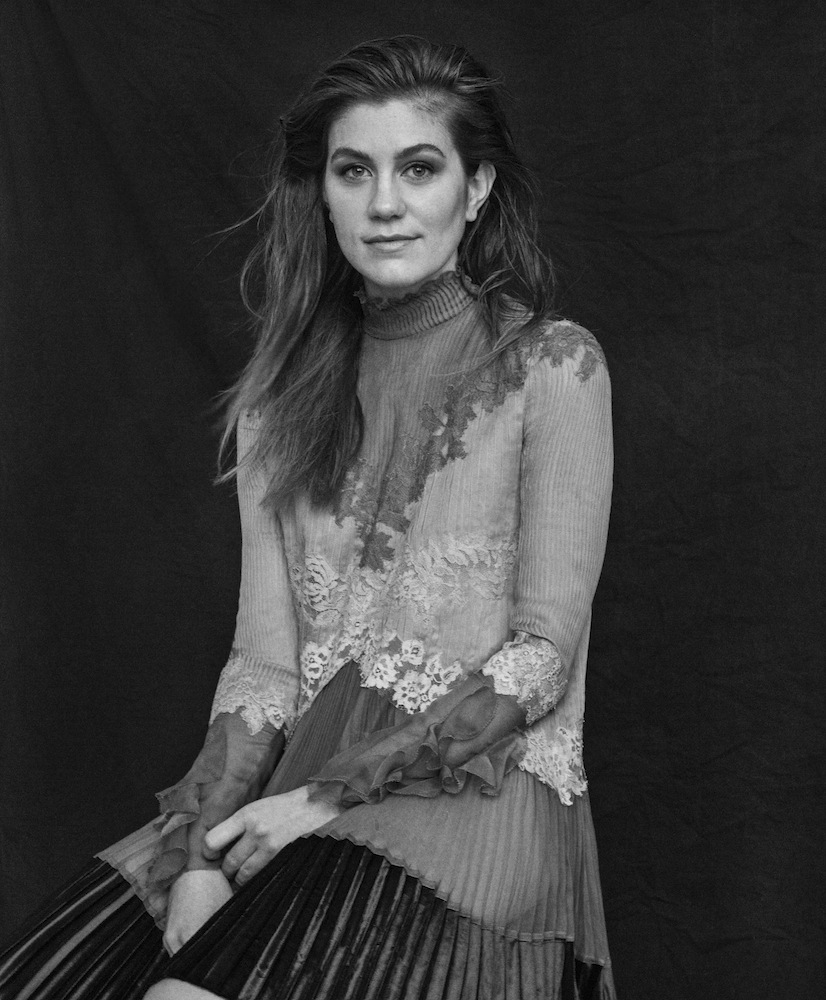
LAURA DREYFUSS IN NEW YORK, JANUARY 2017. DRESS: VALENTINO. PORTRAIT: VICTORIA STEVENS. STYLING: ASHLEY PRUITT. HAIR: WESLEY O’MEARA FOR HONEY ARTISTS USING AG HAIR. MAKEUP: SUZY GERSTEIN FOR HONEY ARTISTS USING TOM FORD.
If you’ve seen Dear Evan Hansen, or listened to the cast recording, you probably have one of the songs stuck in your head. Laura Dreyfuss, who plays Zoe Murphy in the musical, is no different: “I had a friend of mine over and she and I couldn’t stop singing ‘Waving Through a Window,'” she says. “Fortunately they’re great songs, so you can’t get too mad about it, but I do try to balance it out with listening to other music that is inspiring and keeps my brain from being so one-track.”
Raised in New Jersey, the youngest daughter of doctor and non-profit worker, Dreyfuss grew up going to plays in New York City. “I honestly can’t remember a time where I wasn’t performing— bouncing around my house, trying to entertain anyone who would listen,” she recalls. “I have never not been a natural-born entertainer for my family.” When the budding actor was 12, her eldest sister joined the cast of Mama Mia! on Broadway. “I remember being so proud the first time she did the show,” she says. “I’m so fortunate, because I was able to look at her life and see that that’s actually a possibility. Having her guidance and her support has been the most valuable thing for me.”
Performing Dear Evan Hansen eight times a week is no easy feat. Created by the composing duo Pasek and Paul, with a script by Steven Levenson, it is a highly emotional show, dealing with grief, first love, betrayal, and forgiveness. Dreyfuss’s familiarity with and affection for her character is evident in her performance: she’s been with the play since the workshopping stage, and has already completed highly successful runs at the Arena Stage in Washington, D.C. and Off-Broadway. “I think an actor’s dream is to originate a role,” she remarks.
Outside of the theater world, Dreyfuss is most widely known for her arc as Madison McCarthy on the final season of Glee. Later this year, she will make her feature film debut in After Party with Jeremie Harris.
HOMETOWN: Bergen County, New Jersey.
A PRECOCIOUS AUDIENCE MEMBER: We lived, like, 45 minutes outside of New York City, so I saw my first Broadway show when I was six, Les Misérables, and I was mesmerized. Ever since that moment, I knew that I had to be a performer. I remember seeing Glengarry Glen Ross when I was eight. That’s not really a show you might want to take an eight-year-old to, but I think my mom looked at it as, “This is art.” I think you’re never too young to experience good art. I think that we underestimate how children can process art and empathy and what that does to people. The things that are too mature, you don’t even hear or see. That’s something that I remember with Les Mis; I didn’t even know that Fantine was a prostitute until I was in my teens.
FROM ACTING AND SINGING TO MUSICAL THEATER: Even though I was inspired by a musical, it didn’t really manifest in the sense of musical theater for me. The two were always a little separate, I think. I took acting very seriously and I loved to sing everything: Whitney Houston, Mariah Carey, the Beatles—anything I could get my hands on. When I got to college—I went to a musical theater conservatory, Boston Conservatory [at Berklee]—that was the first time where I was told, “Okay, now you have to marry these two skills that you have.” It’s kind of the perfect medium for somebody who appreciates acting and singing; there’s something really beautiful about such a heightened emotion that can only be achieved through song.
FORMAL TRAINING: My sister told me that I should go to Boston Conservatory. She knew some people who had gone and she was like, “These people are incredibly professional and I think that whatever they’re teaching at that school is good and you should be there.” The idea of a conservatory was so appealing to me because I just wanted to do theater. I always loved learning, but I knew from such a young age that theater was what I wanted to do, that I was ready to immerse myself completely in it.
THE EVOLUTION OF DEAR EVAN HANSEN: Two and a half years ago, I was doing the reading of Dear Evan Hansen, and I remember looking up around the room and thinking, “Wow, this is something really special. Even if I don’t get to be a part of it, I want this to succeed as a piece of art, because I think the story is so important and the world needs to hear it.” That was my first experience with the show. Then it evolved and we got to do a production in D.C. and were able to move to Off-Broadway, and now we’re here, which is really exciting. It’s rare as an actor to be with a project from the very beginning.
[Benj] Pasek and [Justin] Paul and [director] Michael Greif were people that I had always admired and had wanted to work with, and I remember getting the notification from my agent that I was going to be doing the reading. I was really thrilled and really excited. At the same time, you do so many readings and workshops that you have to take them with a grain of salt and know that nothing’s permanent. You just do it and see what sticks. This was a really cool experience, to be able to be with something that has gone this far.
The story has always been the same [the whole time]. There have been some tweaks in terms of scene work, but nothing major. Some of the songs have changed since that first reading, but even when we did that first reading, we all looked around at each other and thought, “This is ready.” [laughs] That might be more of a reflection on our ignorance, if anything, but we just felt, “This is so good. These songs are so solid. The story’s so incredible.”
PLAYING ZOE: She is the kind of character that I wish I had seen performed when I was in high school. She’s an incredibly resilient, strong girl. She’s in high school and she has all of these horrible things thrown at her and she could very easily be a victim and she chooses not to be, which is really amazing. She doesn’t allow other people’s opinions to change her sense of self. She has such a strong sense of self that she uses to heal herself, and I think that that still teaches me, as an adult woman, how I want to operate in the world. It’s very exciting to be so complex; she’s not a perfect person and she does make mistakes, but how she deals with her mistakes makes her interesting. I think she will be an incredible woman in ten years.
Without giving too much away, that last scene is such a privilege as an actor because you’re not only relieving Evan of the torment that he’s put himself through, but you’re also relieving the audience. You’re giving them this feeling of, for the lack of a better word, closure. But also, it’s such an ultimate moment of strength because she never gives up her power.
COLLECTIVE CATHARSIS AFTER AN EMOTIONAL SHOW: I think the [Dear Evan Hansen] cast is really helpful. We all know each other so well and we’re all so in tune with one another on- and off-stage. We definitely rely on each other to lift each other up, which is necessary in a show like this. As soon as we get off-stage and we just did a dramatic scene where everyone’s in tears, we do something to make each other laugh. Whether it’s goofing off in the stairwell getting up to our dressing rooms or whatever it might be. I think that bringing that kind of levity is really important. I’m very fortunate to have those people around me. Living with this character for so long, I have so much empathy for this character, so it gets easier and easier to follow her journey, even though it’s a tough journey to follow.
AUDIENCE RESPONSE: That’s been the most rewarding thing. When you do a show like this, you have to be prepared for a lot of conversation that you might not normally have, and hearing a lot of stories from people. I’ve had a lot of women and men say, “Hey, I had a really complicated relationship with my brother or my sister, and watching your journey with this character has given me permission to forgive them and forgive myself,” which is so incredible to hear and gives me a sense of purpose. You realize that this is something that we all deal with; fortunately I have a great relationship with my sisters, but I know that family can be very complex and we have to give each other grace.
Obviously, none of us are counselors, all you can really do is listen and allow it to inspire you to continue to do what you do, and to have a greater empathy for the people around you, because you don’t know what somebody else is going through. The most important thing about this show is that it opens up conversation that might not have taken place. As an actor, the challenge is to figure out how to listen and feel like you are an ear, but, at the same time, these people have to go out into the world and, like Zoe, find their own resilience.
GLEE: I was actually doing the workshop of Dear Evan Hansen during the time that I was screen-testing for Glee. The day of the presentation for the workshop, I was on a red-eye the night before coming back from L.A. I got in at 6 A.M., went to the rehearsal, and did the presentation. I felt like I was seeing double vision the whole day—it was pretty insane. Then, about four or five days later, I found out that I had to move. They were giving me two days to move from New York to L.A. I was out there for about a year, which was cool.
As theater actor, television was really something I wanted to do but it felt so far out of reach, because it is kind of hard to break into it when all you’ve done is theater. I think it’s getting easier now, but it always felt very far away. Then the show, it just came out of nowhere it felt like. I sent in a video audition and assumed no one would ever see it, and then I got a phone call three weeks later saying they wanted me to fly to L.A. It was definitely one of those moments where I realized, “Wow, okay, the impossible is possible.” I’m looking forward to doing more of it, but Glee was a perfect introduction because so many people come from that theater world who do that show, and everyone who worked on the show is very much aware of that and so they were always looking out to help us. The DP and all of the crewmembers knew to tell us, “This is what this means.” Just giving us all the tools that we needed to succeed at it. It almost felt like a crash course in film and television.
DEAR EVAN HANSEN IS CURRENTLY RUNNING AT THE MUSIC BOX THEATRE. FOR MORE INFORMATION, OR TO PURCHASE TICKETS, VISIT THE PLAY’S WEBSITE.


